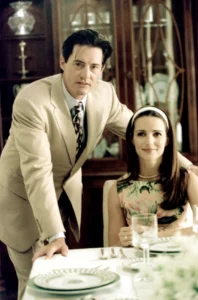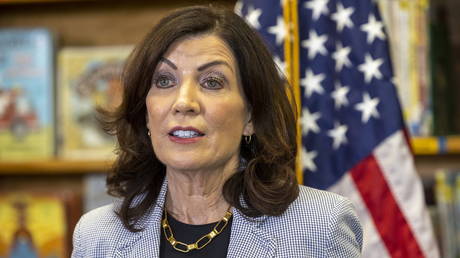Charlotte York and Globalism’s Orgasm Machine

Trey MacDougal (Kyle MacLachlan) and Charlotte York (Kristin Davis) — no longer the ideal American couple.
811 words
I gave the Sex and the City revival series And Just Like That . . . a fair chance, but after three hours of diversity, wokeness, and “body positivity,” I found myself returning to binge on the original series with its almost universally white — and glamorous — cast.
I enjoyed the series when it was on HBO, but even as an unserious twentysomething, there was something about the WASP character’s arc that rubbed me the wrong way. Now older, wiser, and fully accepting of my own “white positivity,” I’ve realized on my second watch-through that the character Charlotte York’s marriage, divorce, and remarriage is an allegory for the Jewish displacement of WASPs as America’s most powerful ethnic group. Watching this plot thread play out was not an enjoyable experience.
Still, I will admit that the timing of the original series was good. When it premiered in 1998, the WASP elite’s replacement had been complete for some time and Jewish power was at its apex. The attacks on 9/11 occurred during the show’s initial run, and Jewish neoconservatives were instrumental in transmuting our dispute with international terrorists into a war of aggression against Israel’s potential regional rival, Iraq. Given all this, it’s understandable that Jews in the entertainment industry (such as Sex and the City’s main writer, Darren Star) would indulge in a victory lap over having toppled WASPs from their throne.
For those few still unfamiliar with the series, Sex and the City follows four thirtysomething women with good looks and truly great jobs as they navigate the New York City singles’ scene. We need only concern ourselves with Charlotte York (played by Kristin Davis), the quartet’s WASPy prude. Charlotte is a mix of conservative personality traits and liberal politics. She is the only one of the four who typically doesn’t sleep with a potential love interest on the first date and is shaken when a man she is dating asks to have anal, or sometimes even oral, sex. However, she also works in an art gallery and picks up the obligatory gay best friend during the series’ run. Further, she practically hyperventilates during any discussion of race that crosses politically-correct boundaries — not that Sex and the City abounded with such conversations.

You can buy Trevor Lynch’s Classics of Right-Wing Cinema here.
We’ll likely be seeing a lot of scattershot conservative women such as Charlotte in future generations if conservative whites continue to outbreed their liberal counterparts — and continue to send their children, who are genetically predisposed toward having conservative personality traits, to be “educated” in rabidly-progressive schools.
Throughout most of the series, Charlotte is an example of a definite type: educated, professional, and financially-successful WASPs. She dates a string of handsome men who look like they came from the pen of early twentieth-century gay illustrator J. C. Leyendecker. She eventually settles on Dr. Trey MacDougal, played by Kyle MacLachlan. They have a nearly perfect romance that turns sour on the night before their wedding when it is revealed that Trey is impotent — the absolute worst characteristic a man can have in the world of Sex and the City, which turns on the axis of women’s gratification. They work through this sexual handicap only to find out that they are unlikely to conceive, as Charlotte’s warm, sweet, and trusting personality belies a body overly hostile to invasive sperm. It’s an interesting spin on WASP frigidity, but not as strange as Trey’s decision to then buy Charlotte a cardboard cutout of a baby in lieu of the one they’ll likely never have as a joke only he seems to get. In the ensuing argument, Trey admits that he has realized that he doesn’t want children, and they end their marriage.
Enter Charlotte’s new, not-so-handsome, but very Jewish divorce attorney, Harry Goldenblatt. If Charlotte is a solid eight by New York City standards of beauty, Harry is barely scraping a four. He is also loud-mouthed, crude, and ill-mannered, and his back hair is egregious. Yet somewhat unbelievably, he gives Charlotte the best sex of her life on his first try. His reliable functioning as a kind of orgasm machine keeps Charlotte around long enough for her to develop feelings and ultimately convert to Judaism so that the two can marry. The happy couple, along with their adopted Chinese daughter Lily, end the series as an idealized image of a small, modern, and multicultural American family.
Charlotte’s arc was no doubt meant to be inspiring to the Sex and the City audience. I’m sure many interpreted its message as telling them to follow their feelings outside of their prejudicial comfort zones in order to find true love and a family in some foreign tribe (or tribes). But for the white identitarian, Charlotte’s story functions as a cautionary tale: Betray your people for globalism’s ugly orgasm machine, and you’ll spend your life raising the world’s orphans.



